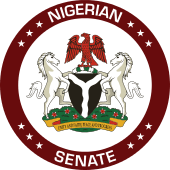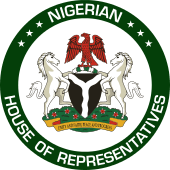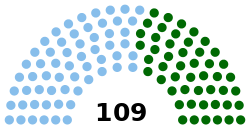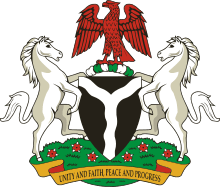National Assembly (Nigeria)
| National Assembly | |
|---|---|
 Seal of the Senate of Nigeria | |
 Seal of the House of Representatives of Nigeria | |
| Type | |
| Type | |
| Houses |
Senate House of Representatives |
| Leadership | |
| Structure | |
| Seats |
469 109 Senators 360 Representatives |
 | |
Senate political groups | |
 | |
House of Representatives political groups |
Other parties (10) |
| Elections | |
| Multi-member plurality system | |
| First-past-the-post | |
Senate last election | 29 March 2015 |
House of Representatives last election | 29 March 2015 |
| Meeting place | |
 | |
|
National Assembly Complex Abuja, Nigeria | |
| Website | |
| http://www.nass.gov.ng/ | |
Coordinates: 09°04′05.5″N 07°30′40.3″E / 9.068194°N 7.511194°E
 |
| This article is part of a series on the politics and government of Nigeria |
|
|
The National Assembly of the Federal Republic of Nigeria is a bicameral legislature established under section 4 of the Nigerian Constitution. It consists of a Senate with 109 members and a 360-member House of Representatives. The body, modelled after the federal Congress of the United States, is supposed to guarantee equal representation of the 36 states irrespective of size in the Senate and proportional representation of population in the House. The National Assembly, like many other organs of the Nigerian government, is based in the Federal Capital Territory, Abuja.
Leadership
The Senate is chaired by the President of the Nigerian Senate, the first of whom was Nnamdi Azikiwe, who stepped down from the job to become the country's first Head of State. The House is chaired by the Speaker of the House of Representatives. At any joint session of the Assembly, the President of the Senate presides and in his absence the Speaker of the House presides.
| OFFICE | NAME | TERM |
| President of the Senate | Bukola Saraki | 9 June 2015–present |
| Speaker of the House of Representatives | Yakubu Dogara | 9 June 2015–present |
Functions
The Assembly has broad oversight functions and is empowered to establish committees of its members to scrutinise bills and the conduct of government officials. Since the restoration of democratic rule in 1999, the Assembly has been said to be a "learning process" that has witnessed the election and removal of several Presidents of the Senate, allegations of corruption, slow passage of private member's bills and the creation of ineffective committees to satisfy numerous interests.
In spite of a more than two-thirds majority control of the Assembly by the then ruling People's Democratic Party (PDP), the PDP government led by Dr. Goodluck Ebele Jonathan and the Assembly have been known more for their disagreements than for their cooperation. President Goodluck has been accused of being slow to implement policy. Many bills, some from as long ago as 2007, are still awaiting the President's assent. While the Assembly has made strong and often popular efforts to assert its authority and independence against the executive, it is still viewed generally in a negative light by the media and many of the Nigerian people. The Assembly sits for a period of at most four years, after which time the President is required to dissolve it and call a new Assembly into session.
The Senate has the unique power to impeach judges and other high officials of the executive including the Federal Auditor-General and the members of the electoral and revenue commissions. This power is, however, subject to prior request by the President. The Senate also confirms the President's nomination of senior diplomats, members of the federal cabinet, federal judicial appointments and independent federal commissions.
Before any bill may become law, it must be agreed to by both the House and the Senate, and receive the President's assent. Should the President delay or refuse assent (veto) the bill, the Assembly may pass the law by two-thirds of both chambers and overrule the veto and the President's consent will not be required. The present Assembly has not hidden its preparedness to overrule the executive where they disagree.
Support
The National Institute for Legislative Studies (NILS)[1] is an organ of the National Assembly established by an Act of Parliament. President Goodluck Jonathan signed into law the National Institute for Legislative Studies Act 2011 on 2 March 2011 following the passage of the same by the Senate and the House of Representatives. NILS builds on the successes of the Policy Analysis and Research Project (PARP), established in 2003 as a capacity building institution of the National Assembly with the financial support of the African Capacity Building Foundation (ACBF). NILS has as its core objectives to provide quality academic and professional research, policy analysis, training, documentation and advocacy on democratic governance and legislative practice and procedures[2] The functions of NILS are similar to the services offered to the US congress by Congressional Research Service, Congressional Budget Office, Library of Congress only on a lesser scale as the institute was just established.[3]
National Assembly State Delegations

See also
- List of committees of the National Assembly of Nigeria
- Nigerian First Republic (1963-1966)
- Nigerian Second Republic (1979-1983)
- Nigerian Third Republic (1993)
- Nigerian Fourth Republic (1999–present)
- Elections in Nigeria
- Politics of Nigeria
- List of legislatures by country
- 7th National Assembly
References
External links
- Official website of the Nigerian National Assembly
- Assemblyonline news on the National Assembly
- Official People and Legislature Information Interchange
